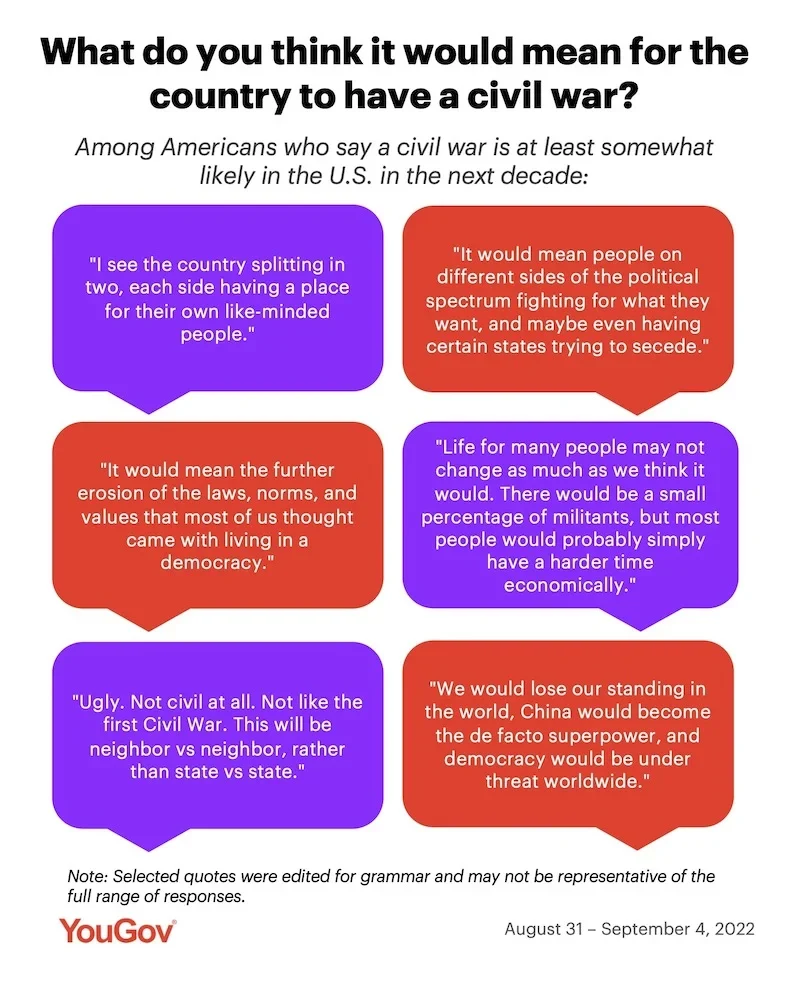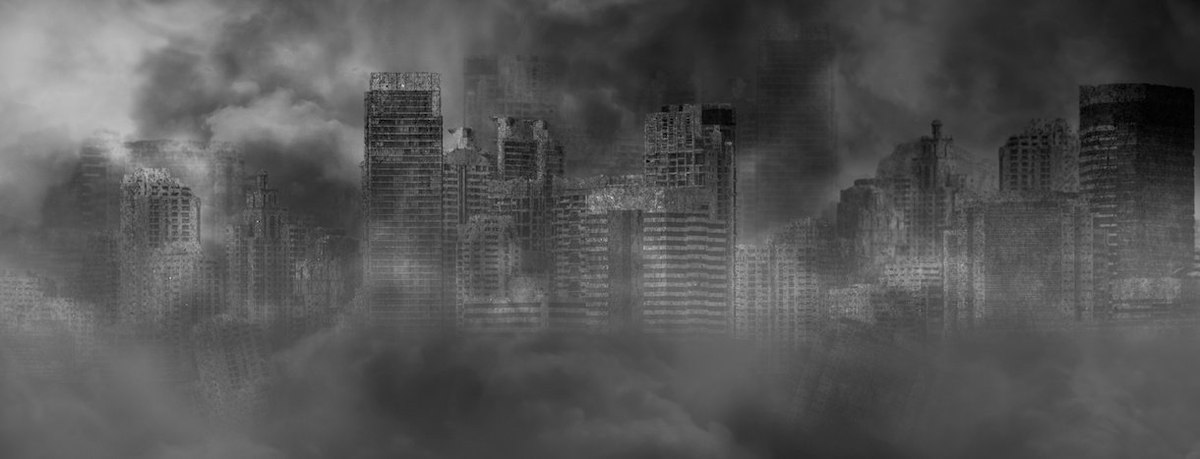Two in five Americans believe a civil war is at least somewhat likely in the U.S. within the next decade, according to recent polling by the Economist and YouGov. But what exactly do Americans think a second American civil war would look like? Among 15 potential future scenarios involving instability or political violence, the one that most Americans consider likely in the next decade is that the U.S. ceases to be a global superpower (50% say this), followed by a total collapse of the U.S. economy (47%). Each of the 15 dire scenarios is considered somewhat or very likely in the next decade by at least 20% of Americans.
We arrived at the list of 15 scenarios with a follow-up question to the Economist finding on a separate poll, asking people who earlier in the poll said they think a civil war is likely to tell us in their own words what they think it means for the country to engage in one. Based on responses to this question, we developed the list of 15 specific future scenarios and included it in another poll asking how likely each is to occur in the coming years.
When asked broadly about the chances of a civil war in the next decade, without specifying what kind, 37% of Americans say one is at least somewhat likely to occur. However, expectations vary across five possible scenarios:
- 40% think a civil war is likely — at least either very or somewhat likely — between Republicans and Democrats
- 32% think it's likely between red and blue states
- 30% think it's likely between the rich and poor
- 29% think it's likely between people of different races
- 20% think it's likely between people living in cities and rural areas
After an end to the U.S.'s global-superpower status and economic collapse, the next most likely scenario is that the U.S. will cease to be a democracy (39% say this is likely within the next decade). Slightly more say it's likely the U.S. will become a fascist dictatorship (31%) than say it will become a communist dictatorship (21%). (The poll didn't ask whether people believe a given scenario has already occurred, so some people who believe this probably are included among those who said each scenario is likely.)
Republicans are more likely than Democrats to believe nearly all of the scenarios asked about are likely within the next 10 years. Two-thirds of Republicans (65%) believe that total economic collapse is at least somewhat likely, compared to only 38% of Democrats. Around half of Republicans (48%) say it's likely that the government will confiscate citizens' firearms; only 17% of Democrats say this. Republicans are also more likely than Democrats to believe there will be a total breakdown of law and order (49% vs. 31%) and that the U.S. will be invaded by a foreign country (41% vs. 24%).
While a similar share of Republicans and Democrats believe it's at least somewhat likely that the U.S. will cease to be a democracy in the next decade, there is disagreement as to which type of government is likely to replace it. Democrats are slightly more likely than Republicans to say the U.S. will be a fascist dictatorship (37% vs. 32%). Republicans, on the other hand, are three times as likely as Democrats to say it will be a communist dictatorship (31% vs. 13%).
In terms of the possibility of a civil war, Republicans are likelier than Democrats to believe there will be one between members of each party (45% vs. 35%) or between people from red and blue states (36% vs. 30%). Democrats are slightly more likely than Republicans to believe there will be a war between the poor and rich (37% vs. 25%) or between cities and rural areas (23% vs. 20%). Democrats and Republicans are equally likely (31%) to expect a civil war between racial groups.
The open-ended question we asked to identify the civil-war-like scenarios to poll about elicited a wide range of responses about what Americans who expect a civil war in the next decade envision one looking like. Some imagined a great deal of violence between neighbors, while others had in mind economic instability or the deterioration of democratic norms.

Do Americans differentiate between the possibility of civil war and other destabilizing outcomes in the next 10 years compared to say, the next 50? To test this, we split respondents into two groups, half of whom were asked to evaluate dire scenarios in the next 10 years, and the other half who were asked about the next 50 years. Overall, we find few differences between the two contexts: Americans evaluate the chances of most events similarly regardless of whether they're asked about the next decade or the next five decades.
Would a civil war be good or bad for the country? The vast majority of Americans (69%) say a civil war within the next decade would overall be a bad thing; 6% say it would be good, 8% say it wouldn't be good or bad, and 17% aren't sure or preferred not to say. Democrats and Republicans are equally likely to say a civil war would be a bad thing.
How similar would a new civil war be to the original one? Two-thirds of Americans (67%) say a civil war occurring in the next 10 years would be very or somewhat different from the first civil war that occurred in the 1860s. Only 16% say it would be very or somewhat similar to the first civil war, and 17% are unsure.
Would the government be able to defend itself against an armed citizen uprising? Americans are twice as likely to believe the military and law enforcement would prevail against armed rebels (51%) as they are to say they would fail (26%). While Republicans and Independents have similar expectations on the matter, Democrats are far more optimistic about the government's prospects: 68% say the military and law enforcement are at least somewhat likely to succeed, relative to 44% of Republicans and Independents.
How concerned are Americans about different types of extremism? The largest share (43%) say they're very concerned about white-supremacist extremism. This is followed by high concern over right-wing extremism (39%) and left-wing extremism (34%). Slightly fewer are very concerned about Christian extremism (31%), Muslim extremism (29%), or racial-minority extremism (28%).
Democrats and Republicans have vastly different concerns when it comes to extremism. Democrats are most likely to be very concerned about extremism among white-supremacists (68%), right-wing groups (60%), and Christians (48%). The greatest share of Republicans are very concerned about extremism among left-wing groups (62%), Muslims (36%), and racial minorities (31%).
In recent weeks, a number of people associated with the far-right anti-government militia group known as the Oath Keepers have faced charges stemming from their involvement in the January 6 Capitol attack. Our latest poll finds that 9% of Americans know someone (including themselves, a family member, a friend, or an acquaintance) who is a member of a militia group.
Younger Americans are especially likely to be familiar with someone affiliated with a militia group: One in four adults under 30 (26%) say they know a person in a militia group compared to only 5% of people who are 45 and older. Another factor linked to knowing someone involved in a militia is whether a person shares a home with a gun-owner: One in four Americans (26%) who say someone in their household owns a gun (other than themselves) also say they know someone in a militia group. There are no significant differences between Republicans and Democrats in terms of their familiarity with militia-group members.
— Carl Bialik and Allen Houston contributed to this article
See crosstabs and toplines for this poll.
Methodology: This survey was conducted by YouGov using a nationally representative sample of 1,000 U.S. adult citizens interviewed online from September 1 - 4, 2022. This sample was weighted according to gender, age, race, and education based on the 2018 American Community Survey, conducted by the U.S. Census Bureau, as well as 2016 and 2020 Presidential votes (or non-votes). Respondents were selected from YouGov’s opt-in panel to be representative of all U.S. citizens. The margin of error is approximately 3% for the entire sample. Responses to open-ended questions mentioned in this article come from a separate poll with the same methodology, fielded starting a day earlier (August 31 - September 4).
Image: Adobe Stock (holwichaikawee)







